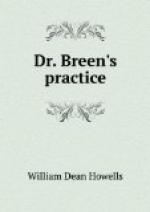animal’s recollection of a long and useful life.
In the two anxious days that followed, Libby and Grace
were associated in the freedom of a common interest
outside of themselves; she went to him for help and
suggestion, and he gave them, as if nothing had passed
to restrict or embarrass their relations. There
was that, in fact, in the awe of the time and an involuntary
disoccupation of hers that threw them together even
more constantly than before. Dr. Mulbridge remained
with his patient well into the forenoon; in the afternoon
he came again, and that night he did not go away.
He superseded Grace as a nurse no less completely
than he had displaced her as a physician. He let
her relieve him when he flung himself down for a few
minutes’ sleep, or when he went out for the
huge meals which he devoured, preferring the unwholesome
things with a depravity shocking to the tender physical
consciences of the ladies who looked on; but when he
returned to his charge, he showed himself jealous
of all that Grace had done involving the exercise
of more than a servile discretion. When she asked
him once if there were nothing else that she could
do, he said, “fires, keep those women and children
quiet,” in a tone that classed her with both.
She longed to ask him what he thought of Mrs. May
nard’s condition; but she had not the courage
to invoke the intelligence that ignored her so completely,
and she struggled in silence with such disheartening
auguries as her theoretical science enabled her to
make.
The next day was a Sunday, and the Sabbath hush which
always hung over Jocelyn’s was intensified to
the sense of those who ached between hope and fear
for the life that seemed to waver and flicker in that
still air. Dr. Mulbridge watched beside his patient,
noting every change with a wary intelligence which
no fact escaped and no anxiety clouded; alert, gentle,
prompt; suffering no question, and absolutely silent
as to all impressions. He allowed Grace to remain
with him when she liked, and let her do his bidding
in minor matters; but when from time to time she escaped
from the intolerable tension in which his reticence
and her own fear held her, he did not seem to see
whether she went or came. Toward nightfall she
met him coming out of Mrs. Maynard’s room, as
she drew near in the narrow corridor.
“Where is your friend—the young man—the
one who smokes?” he asked, as if nothing unusual
had occupied him. “I want him to give me
a cigar.”
“Dr. Mulbridge,” she said, “I will
not bear this any longer. I must know the worst—you
have no right to treat me in this way. Tell me
now—tell me instantly: will she live?”
He looked at her with an imaginable apprehension of
hysterics, but as she continued firm, and placed herself
resolutely in his way, he relaxed his scrutiny, and
said, with a smile, “Oh, I think so. What
made you think she would n’t?”
She drew herself aside, and made way far him.
“Go!” she cried. She would have said
more, but her indignation choked her.




